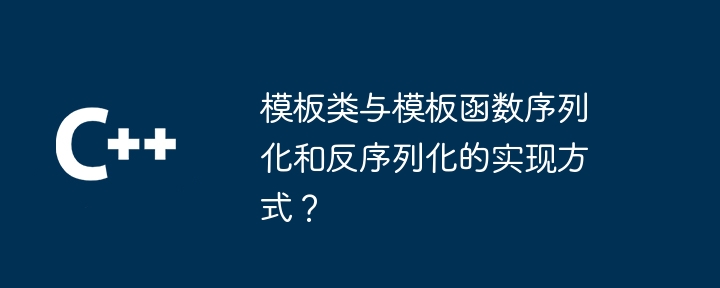
Serialization and deserialization of template classes and template functions can be achieved in a variety of ways, including using binary archives, own serialization, function pointers, and function objects. Use binary archiving to write/read template classes directly to files, and own serialization to define custom serialization/deserialization methods. For template functions, they can be serialized/deserialized using function pointers or function objects.

In C, template classes and template functions are widely used in generic programming . The ability to serialize and deserialize these template instances is critical if they need to be transmitted or persisted across the network or storage. This article introduces several ways to implement serialization and deserialization of template classes and template functions.
// 写入归档
std::ofstream ofs("template_class.bin");
boost::archive::binary_oarchive oa(ofs);
oa << my_template_class<int, std::string>;
// 读取归档
std::ifstream ifs("template_class.bin");
boost::archive::binary_iarchive ia(ifs);
std::pair<int, std::string> my_deserialized_class;
ia >> my_deserialized_class;// 定义一个序列化方法
template <typename T1, typename T2>
void serialize(const my_template_class<T1, T2>& obj, std::ostream& out) {
out.write((char*)&obj.first, sizeof(T1));
out.write((char*)&obj.second, sizeof(T2));
}
// 定义一个反序列化方法
template <typename T1, typename T2>
void deserialize(my_template_class<T1, T2>& obj, std::istream& in) {
in.read((char*)&obj.first, sizeof(T1));
in.read((char*)&obj.second, sizeof(T2));
}// 定义一个模板函数
template <typename T>
T square(T x) {
return x * x;
}
// 定义一个序列化方法
void* serialize_function(void* function) {
return function;
}
// 定义一个反序列化方法
void* deserialize_function(void* function) {
return function;
}// 定义一个函数对象
struct Square {
template <typename T>
T operator()(T x) {
return x * x;
}
};
// 定义一个序列化方法
void serialize_function(const Square& obj, std::ostream& out) {
// 这里可以根据实际情况添加更多数据
out.write((char*)&obj, sizeof(Square));
}
// 定义一个反序列化方法
void deserialize_function(Square& obj, std::istream& in) {
// 这里可以根据实际情况读入更多数据
in.read((char*)&obj, sizeof(Square));
}The following is a binary archive serialization and Deserializing std::pair Example of template class:
#include <iostream>
#include <fstream>
#include <boost/archive/binary_oarchive.hpp>
#include <boost/archive/binary_iarchive.hpp>
using namespace std;
int main() {
// 创建一个 std::pair 模板实例
pair<int, string> my_pair = make_pair(10, "Hello World");
// 写入归档
ofstream ofs("pair.bin");
boost::archive::binary_oarchive oa(ofs);
oa << my_pair;
// 从归档中恢复
ifstream ifs("pair.bin");
boost::archive::binary_iarchive ia(ifs);
pair<int, string> my_deserialized_pair;
ia >> my_deserialized_pair;
// 输出恢复后的数据
cout << my_deserialized_pair.first << " " << my_deserialized_pair.second << endl;
return 0;
}The above is the detailed content of How to implement serialization and deserialization of template classes and template functions?. For more information, please follow other related articles on the PHP Chinese website!
 What are the differences between c++ and c language
What are the differences between c++ and c language
 Recommended learning order for c++ and python
Recommended learning order for c++ and python
 Cost-effectiveness analysis of learning python and c++
Cost-effectiveness analysis of learning python and c++
 Is c language the same as c++?
Is c language the same as c++?
 Which is better to learn first, c language or c++?
Which is better to learn first, c language or c++?
 The difference and connection between c language and c++
The difference and connection between c language and c++
 C++ software Chinese change tutorial
C++ software Chinese change tutorial
 Cost-effectiveness analysis of learning python, java and c++
Cost-effectiveness analysis of learning python, java and c++




